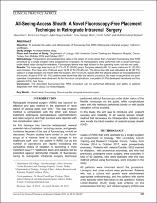| dc.contributor.author | Ekici, Musa | |
| dc.contributor.author | Özgür, Berat Cem | |
| dc.contributor.author | Şentürk, Aykut Buğra | |
| dc.contributor.author | Akdağlı Ekici, Arzu | |
| dc.contributor.author | Aydın, Cemil | |
| dc.contributor.author | Baykam, Mehmet Murat | |
| dc.date.accessioned | 2019-05-13T09:08:24Z | |
| dc.date.available | 2019-05-13T09:08:24Z | |
| dc.date.issued | 2019 | |
| dc.identifier.citation | Ekici, M., Özgür, B. C., Şentürk, A. B., Akdağlı Ekici, A., Aydın, C., Baykam, M. M. (2019). All-seeing-access sheath: A novel fluoroscopy-free placement technique in retrograde intrarenal surgery. Journal of the College of Physicians and Surgeons--Pakistan: JCPSP, 29(3), 263-267. | en_US |
| dc.identifier.issn | 1022-386X | |
| dc.identifier.uri | https://doi.org/10.29271/jcpsp.2019.03.263 | |
| dc.identifier.uri | https://hdl.handle.net/11491/1989 | |
| dc.description.abstract | Objective: To evaluate the safety and effectiveness of fluoroscopy-free RIRS (Retrograde intrarenal surgery) method in urolithiasis. Study Design: An observational study. Place and Duration of Study: Department of Urology, Hitit University Corum Training and Research Hospital, Corum, Turkey, from October 2014 and October 2017. Methodology: Preoperative and postoperative data of 62 cases of renal calculi that underwent fluoroscopy-free RIRS procedure by a single surgeon were prospectively evaluated. All manipulations were performed with a novel technique; under direct vision during the operation. Fluoroscopy device was kept at hand in the operating room, but was not used. Results: The mean age was found as 51.73 ±12.63 (22-82) years. Fortyone patients (66.1%) were males and 21 (33.9%) were females. The mean size of stones were 19.29 ±7.64 (10-40) mm. The stone-free rate was calculated as 42 (67.7%) cases in a single session one month after the surgery, and 15 (24.2%) cases after the second session at the postoperative first month. A total of 57/61 (91.9%) patients were stone-free after the second procedure. No major intraoperative and postoperative complications were observed. As for the minor complications, one patient (1.6%) developed hematuria and four patients (6.5%) had fever. Conclusion: The described fluoroscopy-free RIRS procedure can be performed effectively and safely in patients diagnosed with renal calculi, by endourologists. © 2019 Dustri-Verlag Dr. Karl Feistle. All Rights Reserved. | en_US |
| dc.language.iso | eng | |
| dc.publisher | College of Physicians and Surgeons Pakistan | en_US |
| dc.relation.isversionof | 10.29271/jcpsp.2019.03.263 | en_US |
| dc.rights | info:eu-repo/semantics/openAccess | en_US |
| dc.subject | Endourology | en_US |
| dc.subject | Fluoroscopy-Free Retrograde Intrarenal Surgery | en_US |
| dc.subject | Renal Calculi | en_US |
| dc.title | All-seeing-access sheath: A novel fluoroscopy-free placement technique in retrograde intrarenal surgery | en_US |
| dc.type | article | en_US |
| dc.relation.journal | Journal of the College of Physicians and Surgeons Pakistan | en_US |
| dc.department | Hitit Üniversitesi, Tıp Fakültesi, Cerrahi Tıp Bilimleri Bölümü | en_US |
| dc.authorid | | en_US |
| dc.authorid | | |
| dc.identifier.volume | 29 | en_US |
| dc.identifier.issue | 3 | en_US |
| dc.identifier.startpage | 263 | en_US |
| dc.identifier.endpage | 267 | en_US |
| dc.relation.publicationcategory | Makale - Uluslararası Hakemli Dergi - Kurum Öğretim Elemanı | en_US |


















